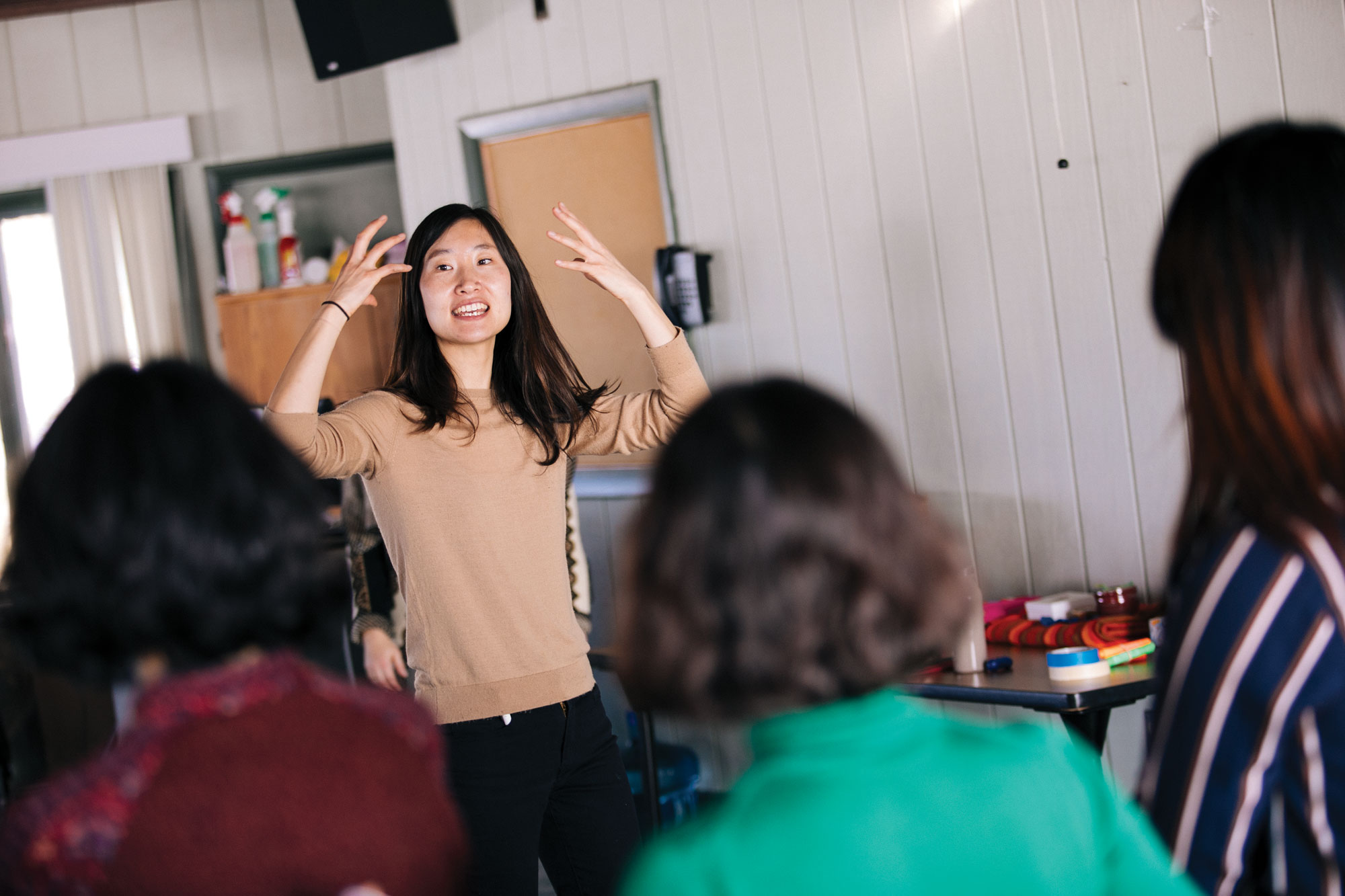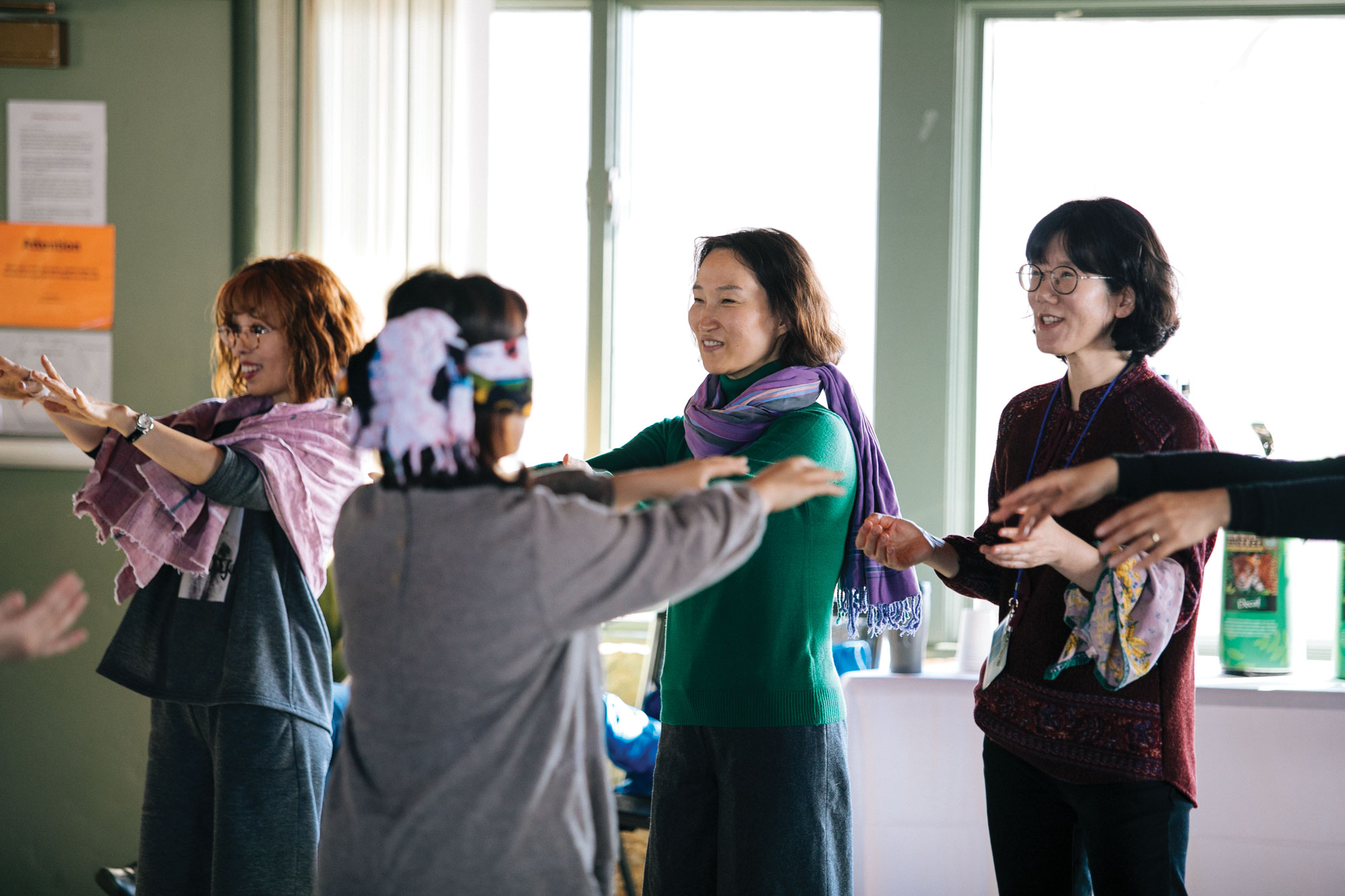
South Korean Educator Eunkyung Ahn MA ‘19 began her CJP studies with an intensive short course about trauma and resilience – and she knew she wanted to pass the skills and values she learned to others.
“My key learning at CJP is the importance of embodied learning in peacebuilding, which is new to peacebuilding education here but also in Korea,” she said.
In February 2019, Ahn did just that – hosting a five-day course at EMU on “Building Resilience for Body, Mind and Spirit” for 18 visiting South Korean K-12 educators.
“This arts-based, expressive experience was designed to revitalize creativity for working in nonviolent social transformation and to exercise creative muscles, a critical foundational practice for challenging violence,” said course creator Katie Mansfield, the lead trainer of the Strategies for Trauma Awareness and Resilience (STAR) program.
Offered in past years at CJP’s Summer Peacebuilding Institute, the course was tailored for this group by Ahn and Mansfield. Goals included an understanding of how systemic and cultural violence affects individual trauma; building resilience in body, mind, and spirit through arts-based, embodied learning; and empowerment for making social change, Ahn said.
Participants engaged in visual artistry, music making, movement exploration, poetry and short story development, and final presentations. A session with visiting co-facilitator and experienced public schools peace educator Ram Bhagat GC ’19 involved drumming and contemplative practices.
Mansfield appreciated the group’s engagement: “I was so impressed at how deeply and directly the educators connected the various expressive arts exercises to the challenges they face as educators, restorative justice practitioners and citizens of South Korea.”

The educators are members of the Center for Restorative Justice in Education, an affiliate of the Movement for Good Teachers, a grassroots Christian teachers association in South Korea. Formed in 2011 in response to a rise in school bullying, the teacher-members work to promote nonviolence and peace in the school environment.
Course participants Inki Hong, Eunji Park and Byeongjoo Lee are senior teachers at schools in urban neighborhoods near Seoul. All learned about circle processes and restorative justice in different ways in Korea, including teacher academies and international workshops, some involving Jae-Young Lee MA ’03, founder of the Korea Peacebuilding Institute.
Before learning about restorative justice, Hong says he played the role of a judge with his students. “Before, when children fight, I would have to decide who is wrong and who is right,” he said. “Now, I don’t decide. I help you figure out what happened and how to make things right. The circle makes equal power and equal power is not usually found in classrooms.”
Children in Korea “do not know how to express themselves,” said Park. “In the circle, they know how. It really develops metacognitive skills.”
Lee, who teaches middle and high school English, said he has appreciated “how the philosophy of RJ can be shaped into many circle styles.”
All three educators work with newcomer teachers in their home settings and plan to share their learnings in hopes of contributing to cultural and systemic change in the educational environment.
After graduation in May, Ahn took STAR II and visited spirituality-based peacebuilding communities before returning to her teaching position in South Korea. “I am so passionate about growing as an educator and helping to educate others about valuing our whole beings,” she said. “It is so important to live with our true selves in our individual and communal lives, and I hope to share that with my students and their parents and other educators in the future.”
SHORT-TERM GROUP TRAININGS MEET SPECIFIC NEEDS
Interested in a group training or workshop on restorative justice, conflict analysis or trauma and resilience? CJP has hosted a growing number of U.S. and international groups for short-term trainings, including judges from Nepal, educators from South Korea and the United States, and two cohorts of restorative justice practitioners from Brazil.
Building on years of experience facilitating trainings around the world, CJP faculty and staff from various programs help group leaders co-create innovative, beneficial educational experiences to meet each group’s specific goals.
“More and more, we see groups looking for creative, culturally-relevant and sensitive approaches to conflict analysis, restorative justice and trauma awareness and resilience,” said CJP Executive Director Jayne Docherty. “Our goal is to support change-makers in recognizing their own strengths and growing their toolkit for response in their professional and cultural context. Our strengths-based pedagogical practices tap into personal experiences, build relationships and engage different learning styles in a safe space.”
Visit emu.edu/cjp for more information or to inquire.